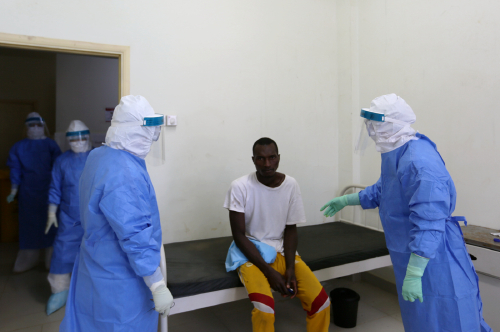 |
|
MEDICAL AID: Chinese doctors offer treatment to a suspected Ebola patient in China-Sierra Leone Friendship Hospital in Freetown on October 26 (HUANG XIANBIN) |

The Ebola epidemic in West Africa has killed 5,459 people since its outbreak in Guinea in December 2013. The virus' rapid spread into neighboring countries led the World Health Organization (WHO) to classify it as an international public health emergency on August 8. The three worst-hit countries are Guinea, Liberia and Sierra Leone.
Secondary infection cases were reported in the United States and Spain in October after three local medical workers contracted the disease after treating patients from Africa in their hospitals. The infected people in the United States and Spain have since been cured.
In addition, a case was discovered in India on November 18, becoming the first appearance of Ebola in Asia. The infected person is a 26-year-old Indian who had spent time in Liberia.
Encouragingly, less-affected Senegal and Nigeria were declared free of Ebola by the WHO on October 17 and 20, respectively. New cases have also declined in Liberia in recent months and the epidemic in Guinea is now under control. However, new cases are still on the rise in Sierra Leone.
The WHO warned that although the rate of new cases is slowing in parts of West Africa, the battle against the epidemic has not yet come to an end.
A regional emergency
The Ebola virus can cause a severe and often fatal hemorrhagic fever in humans. It has a very high case-fatality rate. There have been at least three large-scale outbreaks and over 10 small plagues of the Ebola virus in the last 30 years since the first outbreak in Africa in 1976. Before the ongoing epidemic, the Ebola disease did not disperse outside Africa and was confined to a few countries.
The current outbreak is much more serious than before in terms of deaths and infection rates due to the underdeveloped economy and public health system in West African countries. Local people lack necessary knowledge and conditions to contain an epidemic early. Meanwhile, loose border controls allow the Ebola virus to disperse easily from one country to the next.
Poverty is another major reason for rampant infectious diseases such as Ebola in Africa. Nearly half of African people live in extreme poverty, earning an income per capita of less than $1.25 a day. The undeveloped economy is a factor in the poor state of healthcare services as well as weak prevention and treatments for epidemics.
Many urban and rural areas in West African countries are lacking in medical equipment and healthcare staff. Even clean drinking water resources are much needed. With poor education on average, the public is unaware of basic medical knowledge and prevention measures. Especially in some regional countries, local people customarily touch the dead body of a relative in a traditional funeral, which increases the possibility of infection. Therefore, when a virus becomes epidemic in these areas, it is difficult to contain.
At the beginning of the Ebola epidemic, the international community did not provide prompt help for West Africa. Five months after the outbreak, the WHO realized its seriousness and announced a public health emergency. The Ebola outbreak had not caught the attention of the international community because it had not spread outside Africa before. Many developed countries are thus slow to research and develop vaccines and medicines for curing Ebola.
